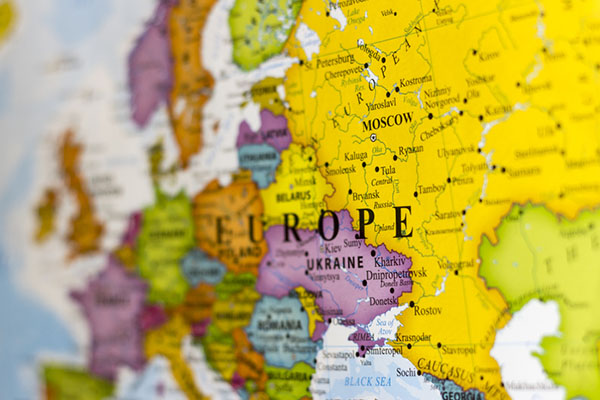We’ve all seen the horrific scenes of the war on Ukraine and the reports of bombing civilian targets. There’s no question that the damage to infrastructure, buildings, industry and the citizens of Ukraine is devastating and will require many years to recover, if ever. Global supply chains are also being interrupted for anything that originates in Ukraine and Russia, or any business conducted in either country.
Sanctions imposed by the U.S. and European countries have had a profound effect on businesses and will most likely affect your global supply chains.
According to Interos, more than 2,100 U.S.-based companies have at least one tier-1 supplier in Russia, and 450 firms (U.S. and Europe) have tier-1 suppliers in Ukraine. But this is not where the real damage to supply chains is occurring.
More than 190,000 firms in the U.S. have tier-3 suppliers in Ukraine or Russia. Tier-3 suppliers provide much of the world’s raw materials including aluminum, neon gas and rare earth elements used in the production of all semiconductors and electronics. If raw materials are not available, this will stop or severely slow the manufacturing of all kinds of products worldwide. We are still reeling from the effects of the pandemic on semiconductors. Another question is—are we likely to experience even more shortages due to the unavailability of neon gas and rare earth elements?
Ukraine is also a major exporter of grains such as corn, barley and wheat as well as fertilizer. The war’s full impact on global food supplies is not yet clear, but prices are already increasing and some parts of the world are already experiencing shortages.
Russian sanctions
The sanctions that the U.S. and Europe have put on Russia have had a significant effect on the Russian economy, and more are likely to come. From a supply-chain perspective, we must carefully consider the following:
Export compliance - The U.S. Department of Commerce and the U.S. Department of State are responsible for licensing any shipment leaving the U.S. Sanctions have been applied to Russia since the invasion of Crimea in 2014. The new, recent sanctions make it nearly impossible to obtain a license to export to Russia now.
In addition, a large number of people have been placed on the Denied Persons List and the Entity List, restricting all shipments to these individuals and companies. Penalties and prosecutions (you’ll go to jail for violations) are increasing for companies that trade, even unwittingly, with Russia or other entities deemed irresponsible or a threat to national security. This includes any transaction through a U.S. bank or foreign bank on the sanctions list.
Russian airlines - Approximately 50% of the world’s air cargo moves as belly cargo on passenger aircraft. Currently, Russian aircraft have been banned from the U.S., grossly restricting air cargo capacity. Many European countries have done the same, limiting air cargo capacity and schedules throughout the world. Other airlines are now refusing to provide service to or from Russia.
Ocean cargo ships - Many ocean freight companies have canceled service to ports in Russia and Ukraine, limiting ocean cargo capacity to and from the region.
Imports from Russia and Belarus - In March, the U.S. House of Representatives passed legislation moving Russia to the highest import tariff duty rates. This legislation is now awaiting approval by the U.S. Senate. President Biden signed Executive Order 14068 on March 11, prohibiting imports into the U.S. of fish, seafood, alcoholic beverages, non-industrial diamonds and other products from Russia.
Bans on oil imports - Restrictions and complete bans on Russian oil imports are likely to have long-term effects on oil prices that we all see at the gas pump, but will also affect fuel surcharges on cargo. FedEx has already announced an increase in prices due to fuel costs.
What to do now
For supply chain professionals, be aware of export regulations and sanctions on shipments bound for ultimate destinations in Russia and/or to any individuals and companies now on the Denied Persons List or the Entity List. You should expect more individuals and companies to be added to these lists in the coming weeks. Be sure to confirm that financial transactions such as Letters of credit or transfers of payments do not involve any Russian banks.
- Prepare and budget for increases in fuel costs for your fleet or for surcharges from freight carriers. This is going to get expensive.
- Be aware that delays are likely to happen in global supply chains due to shortages of raw materials for manufacturing and disruptions in ocean and air cargo schedules.
- Be flexible and plan for alternate suppliers and cargo routes.
This mess is going to take some time and cause major supply chain disruptions.
SC
MR


More Global Trade
- Made in Mexico, manufactured by China
- Retail sales see gains in October, reports Commerce and NRF
- Geopolitical readiness in supply chains: Strategic challenges for leaders
- Tariffs, taxes and trade: The impact of Trump’s reelection on the supply chain
- Aggregators sitting on the throne of Africa’s e-commerce supply chains: What lessons can we learn?
- Cross-border transport 2024: Navigating the surge
- More Global Trade
Latest Podcast

 Explore
Explore
Procurement & Sourcing News
- Made in Mexico, manufactured by China
- Retail sales see gains in October, reports Commerce and NRF
- Geopolitical readiness in supply chains: Strategic challenges for leaders
- With capacity to spare, logistics real estate demand remains subdued
- Tariffs, taxes and trade: The impact of Trump’s reelection on the supply chain
- How to improve demand forecasts for new product families
- More Procurement & Sourcing
Latest Procurement & Sourcing Resources

Subscribe

Supply Chain Management Review delivers the best industry content.

Editors’ Picks




